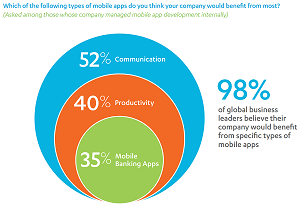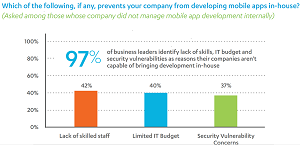News
Study: Execs Don't Trust In-House Enterprise App Development
- By David Ramel
- July 27, 2017
Enterprise mobile apps are good for business and in great demand, but execs don't trust in-house development teams to meet that demand, finds a new study from Kony Inc.
Instead, they are turning to third-party vendors, said Kony, a third-party vendor of a leading mobile application development platform (MADP) that consistently scored high in research firm analyses.
The primary doubts expressed by some 1,000 line-of-business leaders about homegrown app development concern lack of skilled staff, limited IT budgets and security vulnerabilities, says the new "The App Dilemma: Meeting the High Expectations of Business" report (free PDF upon providing registration info).
Most of the polled respondents reported being unsatisfied with the user experience (UX) of enterprise apps, their cost and ongoing maintenance issues -- whether they were developed internally or externally.
 [Click on image for larger view.]
Apps in Demand (source: Kony)
[Click on image for larger view.]
Apps in Demand (source: Kony)
The study reported almost all (97 percent) of global line-of-business executives said employees or organizational divisions requested new mobile apps or app features, and an even higher percentage (98 percent) said their organizations would benefit from such apps for specific tasks.
 [Click on image for larger view.]
In-House Issues (source: Kony)
[Click on image for larger view.]
In-House Issues (source: Kony)
"However, many note the challenges that exist in their organization that are holding them back, including issues with IT," the report said. "In fact, 97 percent of those who don't utilize their internal IT department for mobile app development say it's due to lack of skilled staff (42 percent), limited IT budget (40 percent), and security vulnerabilities (37 percent), among other reasons. 87 percent of business executives who didn't invest in mobile apps in the past 12 months don't even feel their company has the time or resources to develop its own mobile apps. Over half (65 percent) of those who managed app development in-house were not completely satisfied with the overall user experience or with how apps have been managed by internal IT departments."
Other data points of the report include:
- 81 percent of executives would rather work with third-party developers that will build, manage and maintain an app, or work with third-party app design agencies but manage the app in-house, vs. 19 percent of executives who prefer relying on internal IT departments.
- 73 percent of respondents chose external dev help, and 96 percent of those reported difficulties such as higher than expected development (43 percent) and maintenance cost (41 percent), and a lack of customizable options (39 percent).
- 91 percent of business executives have purchased mobile apps through a vendor.
- 92 percent of executives don't feel their outsourced apps are meeting expectations. Global business leaders identify their mobile apps as lacking most in performance (35 percent), customer service (34 percent), employee productivity (30 percent) and sales lead generation (30 percent).
- 82 percent of respondents report having abandoned an app due to lack of adoption (33 percent), poor app performance (32 percent) or high cost of maintenance (31 percent).
"Internal IT resources are stretched and are struggling to keep up with the management and maintenance of existing technologies, evaluating and implementing new digital technologies and addressing the increasing number of employee developed or installed applications," the report concluded. "Current IT departments simply lack the skills necessary to manage new and emerging technologies, all with limited budgets and resources.
"As a result, leading businesses must rethink their mobile app strategies and seek more efficient and cost-effective approaches to addressing the ever increasing demands of its business."
Kony said its AppVantage offering can help in that regard, providing extendable, pre-built apps and components along with custom-designed apps, backed by company experts.
Conducted with Wakefield Research, the report is based on a survey of 1,000 global line-of-business executives in a variety of industries in 18 countries, most from the United States.
About the Author
David Ramel is an editor and writer at Converge 360.